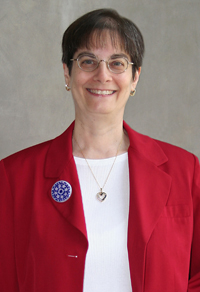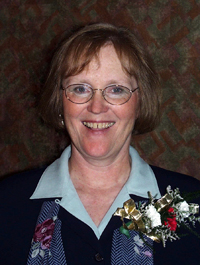 |
Marlene Cohen, Ph.D. |
 |
Bernice Yates, Ph.D. |
“She is the perfect fit,” Dr. Tilden said. “Dr. Cohen’s research develops protocols to guide nursing practice for patients and families undergoing the ordeal of cancer treatment. It dovetails nicely with research already being conducted at UNMC.”
She brings extensive experience and a solid track record of success to the college’s research mission and to its partner, the UNMC Eppley Cancer Center, Dr. Tilden said.
Dr. Cohen is the first person to be named to the prestigious Morehead Endowed Chair, named in honor of Ken Morehead, who was so moved by the nursing care he received at UNMC years ago that he donated $1.75 million to the College of Nursing.
“I dedicated that money to clinical research so that whoever fills this chair will do research that makes the lives of patients, like Mr. Morehead, better,” Dr. Tilden said. “That’s exactly what Dr. Cohen’s research does.”
|
A Brooklyn native, Dr. Cohen said that she is excited about her move to Omaha.
“There is wonderful research going on here. It will be my job to help the College of Nursing faculty with the great work they are already doing — from brainstorming ideas to consulting on publications,” she said.
Dr. Cohen officially assumed her new post on Oct. 1, but she was not on campus until a few weeks later because she was presenting papers on two of her research projects recently at the National State of the Science Congress on Nursing Research in Washington. She presented her findings on the future directions for oncology symptom research and understanding distress during hematopoietic stem cell transplantation. (See sidebar)
She said she plans to pursue new research projects at UNMC.
“I met people here who are doing similar research. It feels like a good match,” she said.
Dr. Tilden agreed and thanked many on campus, including UNMC Eppley Cancer Center Director Ken Cowan, M.D., Ph.D., for helping recruit Dr. Cohen to the medical center.
Dr. Cohen will continue to be involved in research at the University of Texas, where she is a co-investigator on two National Institutes of Health/ National Cancer Institute RO1 grants that total more than $3.2 million. One grant is for the study of methylphenidate for fatigue in advanced cancer patients and the other is a randomized trial on the parenteral hydration in advanced cancer patients.
The study of hydration at the end of life examines the patient’s and family members perspectives as well as the outcomes of hydration.
“Hospice does not hydrate, but hospitals always do. Is one way better than the other? No one has determined that,” Dr. Cohen said.
The second study examines the combination of methylphenidate and a therapeutic nursing telephone call to persons with advanced cancer. The study seeks to understand what issues are most important to patients that nurses can assist with, and also which of these treatments is most effective in managing symptoms, primarily fatigue.
As director of the Niedfelt Nursing Research Center, she also plans to work with College of Nursing faculty members to apply for a center grant, develop more research teams and find innovative ways for faculty researchers to work together.
|
She primarily uses phenomenological techniques, which she describes in a co-authored book, titled “Hermeneutic Phenomenological Research: A Practical Guide for Nurse Researchers,” published in 2000.
In 2001, she edited an issue of “Seminars in Oncology Nursing” in which she dealt with cultural dimensions in oncology care. Dr. Cohen is conducting collaborative research with nurses in Israel and Italy on cross-cultural aspects of symptom management and the explicit technical and technological competences required for practice in knowledge-based cultures now and into the future.
Dr. Cohen also develops programs in clinical settings to promote nursing staff scientific literacy, and enhance their publication and presentation skills.
Her most recent studies include symptom management in blood and marrow transplantation and testing interventions that are psychological adjuvants for the treatment of pain.
She is married to David Cohen, Ph.D., owner of the consulting firm, Anaplerosis Associates, Inc., that specializes in biomedical scientific research. His expertise is in the use of mathematical modeling in the study of metabolism. They have a Bedlington terrier named Sam Houston.
“He’ll have to learn to bark without a southern accent,” Dr. Cohen said.